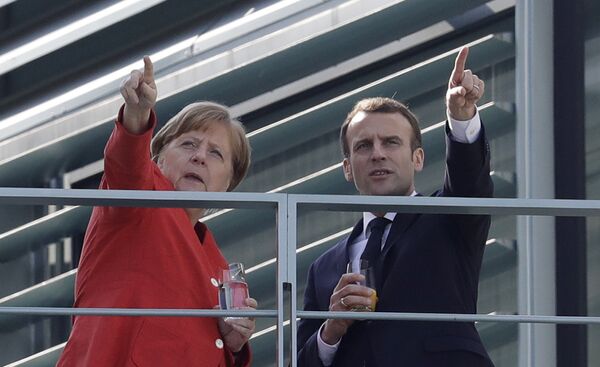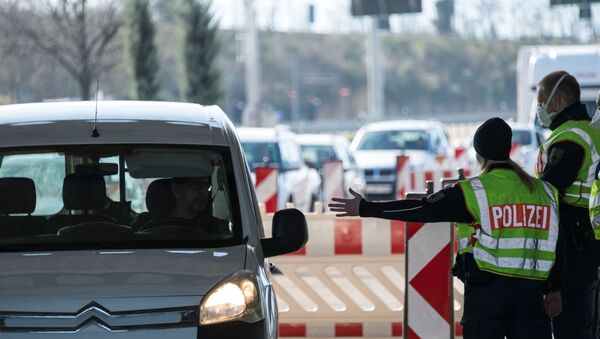The travel ban is due to be implemented by all EU member states plus Iceland, Liechtenstein, Norway and Switzerland. Though people within the union's countries will be able to travel across the EU, some restrictions are in place with some states already shutting down their borders with their EU neighbours either completely or partially. Much in the same vein, the UK Foreign Office (FCO) has advised Britons to restrain from non-essential international travel for 30 days from 17 March.
In today's #EUCO videoconference on #COVID19, EU Member States endorsed @EU_Commission proposals on border measures, the economy, joint public procurement and research to fight the #coronavirus.
— Ursula von der Leyen (@vonderleyen) March 17, 2020
More work ahead, the crisis requires it. pic.twitter.com/itgs2j0iWt
Border Controls May Stay in Place After Pandemic
According to Czech-born Swedish journalist Vavra Suk, the EU's eventual decision to close the bloc "shows that a borderless Europe is just a theoretical concept".
"The nation state is the fundamental and natural way to organise societies, and as soon as there is a crises, we see that everybody goes back to this, last time with the immigrant tsunami of 2015", he says.
In 2015, the EU saw the influx of 1.3 million migrants from predominantly Muslim countries. Suk opines that the refugee crisis has changed the face of Europe prompting regulations on travel and identification with many of them still being in effect today.
"It is highly likely that controls and restrictions introduced today will also largely remain", the journalist foresees. "That does not mean that we will not be able to travel when the epidemic is over, it just means that in the future we will be able to do that in a more regulated way. I think it's important and even necessary that countries know who is entering their borders. History has shown that border controls are not necessarily an obstacle for tourism or trade".
Though the globalist elite "will for sure advocate" a return to open borders policy "the people can clearly see the benefits of borders today" and any attempt to convince them otherwise will only increase Eurosceptic sentiment, Suk believes.
"I think that the ruling elites in Europe will not abandon their position, and this will inevitably lead to the change of governments across the continent", the journalist predicts. "A process that has already started but now will be sped up".
Merkel's Open Border Policy Challenged for the First Time
Joachim Paul of 'Alternative fur Deutschland' (AfD), a member of parliament from Rhineland-Palatinate, echoes Suk by saying that the EU people perceive the closure of the borders outside and within the bloc as "a positive" and "justified" measure amid the novel coronavirus outbreak.
"Chancellor [Angela] Merkel claimed, that it would not be possible to close or control the German borders anyway", he recollects. "The public is witnessing now that this was merely a political legend. Merkel's principle of open borders is challenged for the first time. This will have consequences for the political landscape in Germany".
According to Paul, "only a sovereign state can act quickly and react appropriately" to crises which means that "certain competences must remain in the hands of the nation states and must not be transferred to the EU". The German politician foresees certain changes in the government in the aftermath of the pandemic, "particularly in states with strong Eurosceptic parties, for example, in Germany and France".

EU's Coronavirus Response is a Day After the Fair
Frank Creyelman, honorary Belgian MP and former chairman to the Committee on Foreign Policy, European Affairs and International Cooperation, believes that the bloc should have taken the steps to contain the coronavirus outbreak much earlier.
"It is obvious that the EU and the Eurocrats live in a bubble", he says. "At a moment when they could really mean something for European citizens they hesitated and did nothing. As such the nation states have to intervene themselves. All at a different level with different means and different ‘solutions’. The simple fact that different countries take completely opposite measures in controlling the disease also says enough about a ‘unified’ EU".
The politician notes that the Netherlands and the UK did not implement the necessary measures for quite a while, while a number of other European countries closed their borders and went into quarantine "too late", according to Creyelman.
The EU is United Only on Paper
Francesca Totolo, a writer and researcher of the Italian independent press, says that the decision to close the bloc's borders is not enough to curb the coronavirus outbreak. Furthermore, it is the bloc's austerity policy imposed on Italy that resulted in a dramatic cut in public health funds and exposed the country to the latest pandemic.
"The European Union shows that it is united only on paper", she stresses. "The only benefits enjoyed by European citizens were Erasmus projects, free roaming (for phones), the possibility of freely crossing borders and the free movement of goods. These benefits have been repaid by the total loss of national sovereignty, by a ruthless austerity and by threats of infringement procedures in the event of parameters being breached".
Totolo recalls that previously the EU resorted to border restrictions amid the refugee crisis. However, the bloc resolved this problem at the expense of Italy transforming the country into "the EU refugee camp", Totolo highlights. This time the "Italian people have once again been betrayed by Europe" which was unwilling to provide Italy with much-needed aid.
"Of course, the Union's internal relations will have to change at the end of the coronavirus emergency. A large part of Italians hope for a definitive exit from the EU", she concludes.
As of 18 March 2020, 70,989 cases have been reported in the EU/EEA and the UK, according to the European Centre for Disease Prevention and Control with Italy leading the chart with 31,506 confirmed cases and 2,505 deaths.


